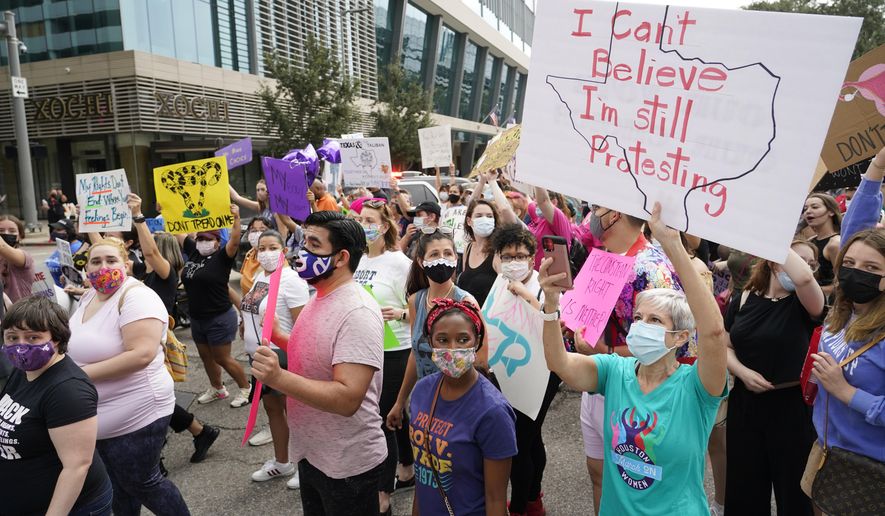The 5th U.S. Circuit Court of Appeals ruled Thursday night that Texas’ fetal heartbeat law banning abortions in the state as early as six weeks can remain in effect while President Biden’s Justice Department challenges its legality.
In a 2-1 move, the three-judge panel granted Texas’ request to halt an injunction put into place by a district court judge earlier this month.
Judge James Ho, a Trump appointee, and Judge Catharina Haynes, a Bush appointee, voted to keep the law in place for now, while Judge Carl Stewart, a Clinton appointee, dissented.
The state took its case to the New Orleans-based federal appeals court after U.S. District Judge Robert Pitman, an Obama appointee, blocked the law, siding with the federal government, which argued it ran afoul of federal law granting the national right to an abortion.
The Texas law bans abortion at around six to eight weeks of pregnancy, which is about the time a fetal heartbeat is heard.
But the Justice Department said Supreme Court precedent dating back decades gives women a right to an abortion up until a fetus is viable, which is usually around 24 to 28 weeks.
Under the law, known as Senate Bill 8, state officials don’t enforce the abortion ban, but private citizens can sue if they have knowledge a provider illegally performed an abortion after a heartbeat was detected.
Texas women have been traveling to neighboring states to receive abortions due to the legislation, according to The Associated Press.
Pro-choice activists said the Justice Department should appeal to the Supreme Court.
“It’s outrageous but unsurprising that the Fifth Circuit has once again denied Texans their fundamental reproductive rights,” said Brigitte Amiri, deputy director with the American Civil Liberties Union. “The district court did the right thing in blocking the ban. We hope the Department of Justice urgently appeals this order to the Supreme Court to restore Texans’ ability to obtain abortion care after six weeks in pregnancy, and we hope the Supreme Court will put an end to harms this law is causing.”
The Supreme Court declined to block S.B. 8’s enactment last month, leaving the legislation in place while litigation against it continues in lower courts.
Abortion providers challenged the law initially — prior to the Justice Department filing its separate lawsuit — and the providers have asked the high court to get involved before a lower court issues a ruling.
That case is also pending at the 5th Circuit, and the three-judge panel handling the Justice Department’s lawsuit on Thursday said it would schedule oral arguments to be held alongside the abortion providers’ case before the same judges.
The three-judge panel overseeing the abortion providers’ lawsuit includes: Judge Edith Jones, a Reagan appointee; Judge Kyle Duncan, a Trump appointee; and Judge Kurt D. Engelhardt, another Trump appointee.
The Supreme Court, in initially declining to halt S.B. 8’s enforcement, did not resolve whether the law was constitutional, but the court noted the abortion providers fighting it had sued defendants who are not likely to enforce the law.
The abortion providers had sued state and local officials, but under S.B. 8, it would be private citizens bringing the lawsuits against the providers. Anyone who successfully sues someone who assists in an abortion after six weeks would receive at least $10,000.
Since the Supreme Court decided in 1973 that women had a right to abortion in the case of Roe v. Wade, pro-life advocates and conservative states have aimed to chip away at that ruling.
Texas is not alone in its recent attempt.
The Supreme Court has agreed to decide if Mississippi’s ban on abortion after 15 weeks runs afoul of its Roe ruling during its new term, which began last week. The case will be heard in December with a ruling expected in June.
Unlike in the Texas case, lower courts blocked the Mississippi law from taking effect, but the Supreme Court agreed to review that move.
• Alex Swoyer can be reached at aswoyer@washingtontimes.com.




Please read our comment policy before commenting.